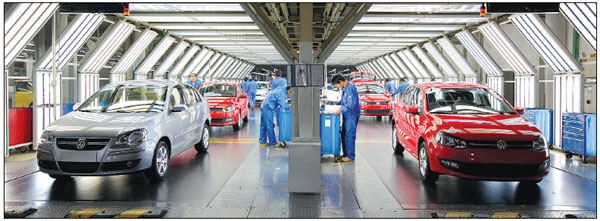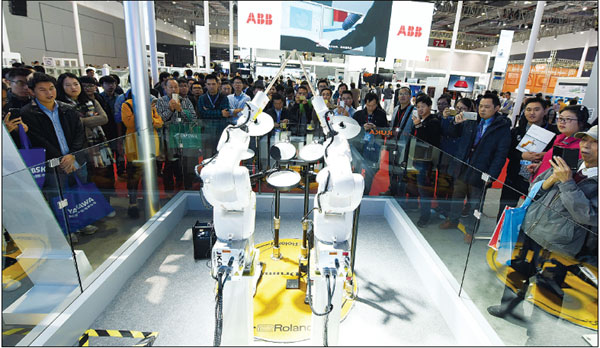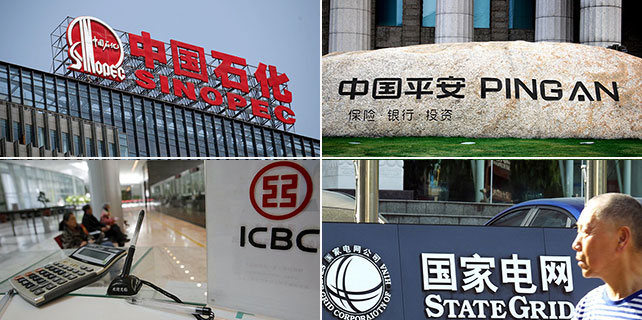Sowing the seeds of growth
|
Demand for robots and new energy cars have been growing quickly in recent years because of the Shanghai government’s innovation drive.Photos Provided To China Daily |
While the city experiences robust development in many sectors due to the government's focus on innovation, industry experts point out that more needs to be done to bolster the private enterprise scene
Shanghai's largest corporations have grown from strength to strength following the introduction of the city's innovation-driven development measures, according to government statistics.
Shanghai's top 10 companies accounted for more than half of the revenue, net profit, assets volume and tax paid by the top 100 companies in the city, based on the latest ranking issued jointly by the Shanghai Enterprise Confederation, Shanghai Entrepreneur Association and Shanghai Federation of Economic Organizations in late August.
All the companies on the list were found to have achieved significant growth in their revenue, net profit and assets volume even though the revenue threshold for making the shortlist was raised from 3.88 billion yuan to 4.55 billion yuan ($591 million to $693 million).
The combined revenue of these companies reached 5.7 trillion yuan in 2016, increasing 6.13 percent from a year ago, or 330.6 billion yuan. In addition, more than 17 enterprises posted revenue takings of more than 100 billion yuan.
Liu Mingyu, an associate professor from Fudan University who specializes in industrial economics, said the robust performance of major enterprises demonstrated that their industrial structures are improving.
"Taking the top 10 corporations for example - their core businesses are focused on automotive, steel, finance, real estate, shipping and food. All of their industries require a sizable scale for survival, so business expansion is their first and foremost task," said Liu.
The top-ranked SAIC Motor Corp Ltd, which is the largest auto company on China's A-share market, has expanded considerably following its mergers with South Korean automaker Ssangyong Motors in 2004 and Nanjing Automobile Group Corp in 2007.
The third-largest corporation, China Baowu Steel Group, is a result of the merger between Shanghai-based Baosteel Group and Wuhan Iron and Steel Corporation in Central China's Hubei province in 2016. The group is ranked first in the sector domestically and second globally, only behind Luxembourg-based ArcelorMittal.
Liu pointed out that the merger of Baowu Steel took place amid a backdrop of industrial restructuring and when a great number of small- and medium-sized steel firms were phased out or consolidated, swelling the market share of large steel makers even further.
Fifty-seven of the companies on the list come from the service sector, and their total revenue grew 179.5 billion yuan from a year ago while 33 are manufacturing corporations which saw their revenue increase 128.2 billion yuan. The remaining 10 come from the property industry.
Manufacturing vs service
There has been constant debate over whether the city's economy should be mainly supported by manufacturing or service, and statistics showed that Shanghai has struck a good balance, with both sectors experiencing robust growth in the first half of 2017.
According to official statistics, the city's value-added industrial output increased 7.3 percent year-on-year from January to June, beating its GDP growth of 6.9 percent. The automotive and electronic information industries were the best performers.
Driven by demand from new car models and new energy cars, the city's automobile sector grew 22 percent from a year ago to become the greatest contributor to industrial growth. The electronic information industry grew 14.5 percent.
Meanwhile, productive service reported a 10.5 percent growth year-on-year in revenue. In addition, all types of exhibition space soared by 19.2 percent, e-commerce trade volume expanded by 21.7 percent, total online retail swelled by 29.5 percent, and international cruise berth vessels grew by 7.5 percent.
Liu said that this growth across the board is a result of a "double-engine driven economy" which relies on both the manufacturing and service industries.
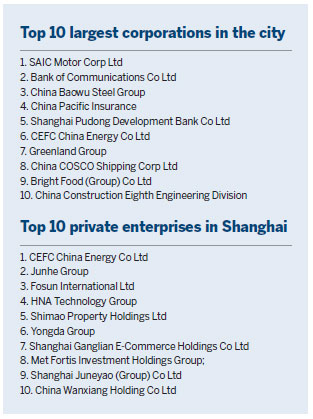
"The service industry has been growing rapidly for several years. The manufacturing sector has started to catch up with this pace," he said.
According to experts, the boundary between the manufacturing and service industries is getting vague and both stand to benefit from each other's development.
In recent years, the municipal government has been driving the development of the "four new economy" - it refers to new industry, new business pattern, new technology and new mode - to tackle skyrocketing cost, limited resources and a bottleneck in economic development.
"The creative policy has greatly improved Shanghai's innovation atmosphere and we have seen quite a few bright spots," said Lei Xinjun, director of the Institute of Economics at the Shanghai Academy of Social Sciences.
The essence of the "four new economy" concept lies in that products would only be researched and developed in accordance with market demand, in turn boosting efficiency in production and preventing oversupply.
Under the new guidelines, the government will "give way" to enterprises and research the problems that companies face in their operations before creating solutions applicable to the whole city.
As part of restructuring efforts, the municipal government set up a problem-finding mechanism to help companies that are facing a bottleneck in their operations and unveiled guidelines encouraging industries to cooperate with one another.
To date, there are up to 100 companies related to Beidou Navigation Satellite System and their total industrial scale for 2016 is expected to reach 7 billion yuan, making it the fifth consecutive year it recorded growth in excess of 20 percent.
The nation's first intelligent internet-connected automotive demonstration base was established in Shanghai, with the Internet-of-Vehicles value expected to reach 20 billion yuan.
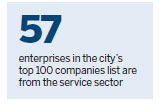
Shanghai also launched a three-year program for promoting the eco-system of manufacturing and internet collaborative development, which is expected to benefit industries that are looking to get connected with the internet.
According to the Shanghai Municipal Commission of Economy and Informatization, 30 benchmark industrial internet factories will be formed, 300 innovative application projects will be incubated, and more than 20 service providers with international competitiveness will take shape by 2018.
"Talents are the key to innovation, and to attract the proper talents, using a good innovative environment will be the deciding factor in the future development of the city's industries," Lei said.
|
The automotive sector in Shanghai grew 22 percent from a year ago to become the biggest contributor to industrial growth.Gao Erqiang / China Daily |
The Achilles' heel
Though Shanghai looks to be well on its way to becoming an international hub for finance, shipping, trade and technological innovation, industry experts pointed out that the city does have an Achilles' heel that could prevent it from fulfilling its full potential - private businesses.
Only 13 companies from Shanghai made it to the latest rankings of China's top 500 private enterprises, one less than the previous year.
In contrast, the neighboring province of Zhejiang is home to 120 of the enterprises listed.
Shanghai has historically been China's industrial base since the founding of the People's Republic of China, with its industrial sector used to account for nearly 20 percent of the nation's total.
Lei pointed out that nearly all the companies in the sector are either State-owned or collective-owned enterprises.
In addition, the city has since the 1990s been a hotspot for foreign-funded enterprises entering the China market.
The combination of these two factors meant that private-funded businesses have only a very narrow space to grow.
Experts noted that innovation input by private enterprises is crucial to the development of the city into a technological innovation center with global influence.
"As a matter of fact, a large quantity of the innovations would come from small private-owned enterprises, just like the creative small- and medium-sized enterprises in the US," said Liu.
He noted that Zhejiang has done a better job in offering policy, resources and public service for all business, while Jiangsu's favorable environment, quality of life and public service policies attracted private enterprises to grow and develop.
He said that Shanghai should learn from these successful examples to better promote its own private enterprise sector.
wang_ying@chinadaily.com.cn
|
A robot performs percussion music at an industrial fair in Shanghai in November. Automation will play a key role in the city’s innovation-driven transformation.Provided To China Daily |
(China Daily USA 09/15/2017 page8)








